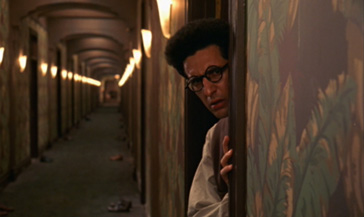|
|
Viking Night: Barton FinkBy Bruce HallJanuary 19, 2017
I mentioned heroes, right? As hot a mess as everything else is, none of it comes close to what happens when in a subplot, Fink strikes up a friendship with his idol. WP Mayhew (John Mahoney) is one of the most respected writers of the day (the “day” being the 1940s), and he has settled in Hollywood with the woman who may or may not just be his secretary (Judy Davis). Mayhew turns out to be very different from the man whose writing Fink respects, and as the narrative darkness of this plot begins to influence Fink’s world back at the hotel, the movie takes on a distinctly surreal feeling. Which includes, by the way, some of the most tasteful use of Dutch angles I can remember seeing. I notice that in particular with Barton Fink because the second half of the film gets more and more bonkers until you’re not sure whether or not we’re in the same universe anymore. I found myself looking for signposts, trying to get my bearings. Then, finally, the story strikes a landing. That’s all I can say, unless I can think of a way to describe how I feel about it without ruining the content. I mean, part of Barton Fink is a borderline brilliant study in how torturous the creative process can be to the truly dedicated artist. The other part of the movie feels like it’s getting lost in the woods before, as I said, it strikes that landing. I know - imagine Mary Lou Retton, flipping and spinning her way through your mind now, just as she (always) is through mine. But when she strikes that iconic pose they’ll eventually put on the Wheaties box, imagine she’s bald and has no teeth. You’d WANT to clap, because she Mary Lou-Rettoned the hell out of that routine. But...ew...what? I just want to prepare you - not just for the nightmares you’re probably going to have tonight, but for how you’ll feel at the end of Barton Fink. Are you okay with a potentially great film making the conscious decision to let some of its biggest plot points play out off screen? Before leaving a surprising amount of it unresolved? I’m fine with unanswered questions, but when so much of what you’ve spent two hours investing in ends up feeling fruitless, that can be frustrating. No doubt, the weirdness that characterizes the last half or so of Barton Fink is disorienting, at first. But I think when you step back and take the long view, when all is said and done you’ll see some interesting character arcs. Some will seem fulfilling, and some will feel arbitrary. But the common thread holding it all together - at least my interpretation of it - is ultimately satisfying. And I’m not even sure I mean “to me” as much as I do certain characters in the film. Barton Fink is not a Flawless Victory. But like most Coen-related material, it feels a little like Sophocles and Arthur Miller wrote a play, someone filmed it, and that film mostly succeeds on its own terms. There aren’t many filmmakers you can say that about.
|

|
|
|

|
Friday, November 1, 2024
© 2024 Box Office Prophets, a division of One Of Us, Inc.


